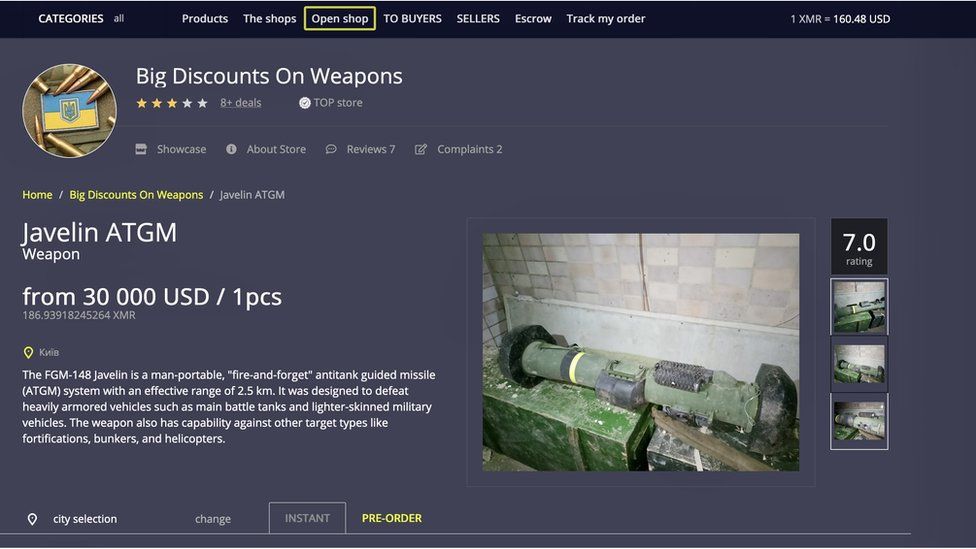ARTICLE AD BOX
By Maria Korenyuk, Lucy Swinnen and Jack Goodman
World Service Disinformation Team
 Image source, Anonymous
Image source, Anonymous
The BBC contacted the person who claimed to sell an anti-tank weapon on this dark web marketplace
Russian state TV claims Ukrainians are selling US-donated weapons on the dark web. The BBC investigated one such marketplace, spoke undercover to those apparently selling weapons, and gathered evidence that suggests the adverts for weapons are fake.
"Ukrops [a derogatory Russian slang term used to refer to Ukrainians] are selling Javelins on the darknet. The command of the Armed Forces of Ukraine resells equipment and weapons supplied by Nato." This message about anti-tank weapons was posted on Twitter and Telegram on 2 June by pro-Kremlin English-language account ASB Military News.
The account has been recently suspended by Twitter but still exists on Telegram, where it has more than 100,000 subscribers.
On the same day, another pro-Kremlin Telegram channel, with 700,000 followers, posted in Russian: "Thanks to Biden and European friends of Ukraine, Javelins, machine guns and even tanks will pop up all over the world in the hands of terrorists and criminals."
Pictures attached to the post showed an advert allegedly selling the FGM-148 Javelin, a US-made anti-tank missile system, for $30,000 (£26,000) and promising to deliver the weapons to the Ukraine-Poland border or abroad.
These posts were quickly picked up by mainstream Russian state TV, which routinely runs stories claiming Ukraine is selling weapons supplied by the West.
We decided to investigate these accusations ourselves using laptops that could not be linked back to the BBC. With a specialised web browser, we accessed the dark web where the level of anonymity attracts criminal activity.
We found several sellers on the same marketplace mentioned by Russian state media outlets. They said they were selling Nato weapons, and their geolocation was Kyiv. However, the name of Ukraine's capital was misspelled in Ukrainian.
This was not the only inconsistency.
Passing Syrian weapons off as Ukrainian
One of the main sellers often mentioned in Russian media reports is known as "Weapons Ukraine".
The seller claims to have made 32 successful deals selling US-made carbines [a type of automatic rifle], pistols and other rifles all allegedly delivered within Ukraine.
However, the BBC found that many of the photos of the weapons were not as they appeared.
Your device may not support this visualisation
The red warning sign indicates the image is old or has been manipulated
We found the image of the M4 carbine posted on a Russian website in 2014. The image of another rifle advertised by the seller had also been taken in 2014 and posted on a gun enthusiast's site.
Another seller called "Big Discounts On Weapons", claiming to sell US-made Javelins and drones recently provided to Ukraine by its Nato allies, was more inventive.
An advert for a drone for sale was manipulated to include the name of the dark web marketplace
The vendor photoshopped several old pictures - including ones of damaged drones - to make them look as if they were taken directly by him, and added the name of the marketplace.
We spoke to StopFake, a Ukrainian fact-checking organisation. It found that the drones attached to the advert matched those of two Switchblade 300 drones with the same serial numbers shot down in Syria in 2015 and 2016.
'Arms dealers' using Google Translate?
Russian state media repeatedly claim that the people behind these advertisements are Ukrainian. So we decided to get in touch with so-called "sellers" and check for ourselves.
The vendor selling Javelins and Switchblade 300 drones asked us to contact them on a messaging app where they were registered under the username "javelinusa".
We spoke to them undercover, asking how we could buy weapons.
"Put money into your account, then we'll invite an administrator to this chat. We'll announce our terms and conditions. We'll place goods into a stash. When you receive them, you'll text us that you're happy with everything, and then the administrator will transfer your money to me," javelinusa texted us in Ukrainian.
However, in the course of our online conversation we noticed that their Ukrainian was full of grammatical errors. When asked about it, the "seller" replied that they were from Poland.
We asked a linguist to analyse our chat with the trader.
"The person behind these messages is Russian-speaking," said Daria Lewicka, expert in Polish language and a Ukrainian-Russian-Polish interpreter.
She says there is substantial evidence that the messages written in Ukrainian were translated from Russian with the help of an online translator.
"I see a lot of 'Russianisms' in his Ukrainian language, but I don't see any 'Polonisms' at all. For example, he uses a phrase "зуби не заговорюй" [which can be translated as "don't beat around the bush"]. This is a common Russian phrase and it has no equivalent in Polish."
The seller also made several typos, which meant the online translator could not understand them, and left the original words. They were both Russian words written with Russian letters.
We highlighted misspelled Russian words and letters during our chat with the seller
Later, we managed to contact another seller from "Weapons Ukraine".
In the online chat, the trader also made grammatical mistakes in tenses and word endings, suggesting he was not a native Ukrainian speaker and that he was translating his messages.
The linguist also found inconsistencies in many reviews mostly posted in Polish on the site, suggesting they were posted with the aid of a translation service.
"Real people don't talk like this," Ms Lewicka said.
A threat to EU citizens?
Despite the inconsistencies, Russian state media site RT depicts the sellers' ads and reviews as evidence that "potentially suggests that the Ukrainian arms smugglers may have already established contacts with [Polish] border guards and are able to cross in and out of Poland without complications".
"Javelins can shoot down planes. And Stingers [US-made air-defence systems] can fall into the hands of terrorists and become a safety risk to European airports," claimed a separate report by Russia's Channel One.
Image source, Channel 1
Image caption,Russian state TV station Channel 1 aired a report claiming weapons were being sold on the dark web
Serhiy Kharchenko is a fact-checker from StopFake specialising in tackling Russian propaganda. He says this is how the Kremlin uses fake news to reduce trust in Ukraine and disrupt arms supplies to Kyiv.
"Their goal is to sow panic in Europe, saying that these weapons can be used against European citizens."
He says these stories were produced by Russia primarily to influence an international audience.
The BBC found stories about the weapons sales published in English, Japanese, Vietnamese and several other languages across a range of sites including a mainstream Turkish news outlet and fringe American blogs and conspiracy sites.
Could the whole marketplace be a Russian hoax?
Cybercrime Threat Intelligence Company KELA investigated the marketplace. It believes the listings were publicised by pro-Russian propaganda sources, or possibly created by them.
KELA says it is suspicious that the marketplace has relatively minimal activity - a low number of trades taking place - and that it is reasonably unknown, even among those who visit dark web marketplaces.
"Usually, you would find people who know a marketplace. But we didn't find any reviews or recommendations of this platform. We had a lot of trouble finding anything about this marketplace, any kind of feedback," says Irina Nesterovsky, KELA chief research officer.
She questions how Russian journalists found it so easily.
Ms Nesterovsky says it is not clear if the adverts were created specifically by pro-Russian actors or if scammers active on the dark web created them independently, and then pro-Kremlin sources picked them up.
But the timing and the similarity of claims made by Russian state media outlets suggest that it could be an organised disinformation campaign.
Mr Kharchenko agrees and is concerned that the same marketplace could be used by Russian propagandists to produce other false stories.
"Now Russians have been creating stories accusing Ukraine of selling weapons. But who knows - later they might use the same marketplace to spread fakes about so called 'sales' of other 'goods' and 'services'. If they have created this marketplace, why not to use it? All they want is to sow the seeds of doubt and denigrate Ukrainians."

 2 years ago
39
2 years ago
39








 English (US) ·
English (US) ·